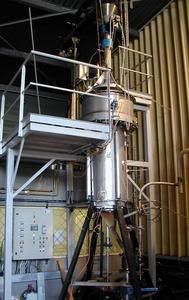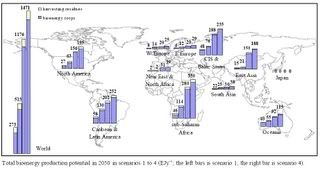French research consortium in biomass-to-liquids project - analyses three gasification technologies
 France's chief research agency concerned with agronomy and development in the developing world (CIRAD) announces [*French] that a consortium of research organisations is finalizing a project aimed at developing an industrial process capable of transforming any type of lignocellulosic biomass into liquid biofuel that can be used in today's automotive engines, at a competitive cost. The technical pathway selected is thermochemical conversion by steam and liquefaction via the Fischer-Tropsch process - this 'biomass-to-liquids' (BtL) chain results in so-called 'synthetic biofuels'.
France's chief research agency concerned with agronomy and development in the developing world (CIRAD) announces [*French] that a consortium of research organisations is finalizing a project aimed at developing an industrial process capable of transforming any type of lignocellulosic biomass into liquid biofuel that can be used in today's automotive engines, at a competitive cost. The technical pathway selected is thermochemical conversion by steam and liquefaction via the Fischer-Tropsch process - this 'biomass-to-liquids' (BtL) chain results in so-called 'synthetic biofuels'.The project, known as 'GASPAR' is funded by the French Agency for Environment and Energy Management (ADEME), and is part of a larger national program which focuses on producing ultra-clean next generation biofuels for aviation, road and marine transport from France's abundant biomass resources. But results are transferable to biomass rich developing countries in the tropics and subtropics (see below), hence the participation of scientists from the Biomass Unit of the CIRAD (Centre de coopération internationale en recherche agronomique pour le développement). Other GASPAR researchers include scientists from Commissariat à l'Energie Atomique (CEA, nuclear energy agency), the Institut Français du Pétrole (IFP) and the Groupe de recherche sur l'Environnement et la Chimie Atmosphérique (GRECA) at the Université Joseph Fourier in Grenoble.
The consortium currently estimates that BtL fuels can replace 15% of France's liquid fossil fuel consumption 'easily' and at 'highly competitive' prices (with oil at $96 per barrel), even though a 45% substitution over the longer term would be feasible.
Via a range of pilot programs, GASPAR will analyse different gasification methods and technologies with the goal to obtain the most optimal types of syngas useable for further transformation into liquid fuels.
Biomass gasification is beginning to take a considerable share in co-generation plants that produce both heat and power, with several large facilities currently operational in France. For the production of synthetic biofuels, these gasification processes are currently unsatisfactory. The quality of the gas must be improved so that a hydrogen and carbon monoxide rich syngas is produced in a cleaner and more straightforward manner. The synthesis steps (Fischer-Tropsch) have progressed further and need less research.
In search for a better syngas, GASPAR looks at four different technologies: (1) gasification in fixed bed reactors, (2) gasification in entrained bed reactors, (3) in fluidized bed reactors and (4) at the treatment of tars at a temperature of 1000 degrees celsius:
 energy :: sustainability :: biomass :: bioenergy :: biofuels :: gasification :: synthesis :: Fischer-Tropsch :: synthetic biofuels :: biomass-to-liquids :: developing countries :: France ::
energy :: sustainability :: biomass :: bioenergy :: biofuels :: gasification :: synthesis :: Fischer-Tropsch :: synthetic biofuels :: biomass-to-liquids :: developing countries :: France :: Phases 1 to 3 are aimed at comparing the three gasification processes and to determine their optimal operational conditions for the production of a syngas, without analysing the resulting tars. The pilot trials will be conducted at the relatively large scale reactors at the CIRAD and the CEA.
The fourth phase consists of analysing the cracking of tars which result from the biomass gasification. In this step, experiments in a gas treatment reactor will be conducted to lower the tar contents of syngases which must allow for a more efficient production of biofuels.
The research consortium is optimistic about the potential of the technology for France, estimating that synthetic biofuels can replace around 25 million tons of oil equivalent per year, with a first objective of replacing 8 million tons (which is 15% of France's liquid fossil fuel consumption) deemed 'very feasible'. GASPAR will result in fuels that can be utilized immediately in existing infrastructures and engines without any adaptation - synfuels can replace 100% of gasoline/diesel in a fuel tank (unlike first generation biofuels like ethanol and biodiesel). The BtL process thus promises to substitute a very significant part of France's transportation fuel needs.
Key CIRAD researchers in the project are Laurent Van de Steene, Eric Martin, Ghislaine Volle, François Broust, Ferdinand Fassinou, Jean-Philippe Tagutchou.
Developing countries
Interest in this technology is growing, because it could allow developing countries with a large biomass potential to export Fischer-Tropsch fuels easily. A recent article in Energy & Fuels, to cite just one example, documents the potential and hurdles of this vision. In "The impact of biomass pretreatment on the feasibility of overseas biomass conversion to Fischer-Tropsch products" researchers compare different biomass densification options (pelletisation, pyrolysis into bio-oil, or local BtL production).
The study concludes that large-scale, central, overseas BtL synthesis plants would be the most attractive route for the export of biomass. However, local logistic aspects require the construction of several small-scale synthesis plants, causing significant economical disadvantages due to economy of scale. The FT product can be produced from overseas biomass for 15 euro/GJ (or 55 euro ct/L of diesel equivalent). At the crude oil prices of late 2005 (around $60/bbl), large-scale BtL was considered as an economically feasible technology. WIth oil prices currently at US$96 per barrel, the option has become quite attractive.
Picture: one of the biomass gasification reactors utilized for GASPAR. Credit: CIRAD.
References:
CIRAD: "Gazéification de la biomasse pour la synthèse et la production de carburants renouvelables" - project overview.
Zwart Robin, Boerrigter Harold, Van Der Drift Abraham, "The impact of biomass pretreatment on the feasibility of overseas biomass conversion to Fischer-Tropsch products", Energy & Fuels , 2006, vol. 20, no5, pp. 2192-2197
Article continues
 --------------
--------------
 A new Agency to manage Britain's commitment to biofuels was established today by Transport Secretary Ruth Kelly. The Renewable Fuels Agency will be responsible for the day to day running of the Renewable Transport Fuels Obligation, coming into force in April next year. By 2010, the Obligation will mean that 5% of all the fuels sold in the UK should come from biofuels, which could save 2.6m to 3m tonnes of carbon dioxide a year.
A new Agency to manage Britain's commitment to biofuels was established today by Transport Secretary Ruth Kelly. The Renewable Fuels Agency will be responsible for the day to day running of the Renewable Transport Fuels Obligation, coming into force in April next year. By 2010, the Obligation will mean that 5% of all the fuels sold in the UK should come from biofuels, which could save 2.6m to 3m tonnes of carbon dioxide a year.














Tuesday, November 06, 2007
Harvard Center for International Development: "Biofuels can match oil production"
Biopact readers will recognize several points made by Hausmann, especially those dealing with the major policy and market transformations needed which must allow the 'biofuel super powers' of the future to supply world markets. Like many others, he too stresses that, with the right policies, the bioeconomy offers major chances for social and rural development in the Global South. Moreover, the author outlines the possible effects of biofuels on OPEC's monopolistic power.
Because prof Hausmann is a well known analyst of development economics and has served in major international development organisations (World Bank, Inter-American Development Bank, and as a minister in the Venezuelan government) and thus his insight carries some authority, we republish his essay here in full:
Peering into the future seldom produces a clear picture, Hausmann writes. But this is not the case with bio-energy. Its long-term impacts on the global economy appear to be pretty clear, making many long-term predictions quite compelling, including the demise of the price-setting power of the Organisation of the Petroleum Exporting Countries and the end of agricultural protectionism.
First, technology is bound to deliver a biofuel that will be competitive with fossil energy at something like current prices. It probably already has. Brazil has been exporting ethanol to the US at an average delivery price of $1.45 for an amount with the energy equivalence of a gallon of petrol. It is doing so profitably and in increasing amounts, in spite of a 54 cents a gallon tariff to protect American maize-based ethanol producers. Many countries are following suit.
But ethanol is an inconvenient chemical compound that is corrosive and soluble in water, thus limiting its immediate market to that of a gasoline additive. However, this is just the Betamax phase of the industry. There is plenty of private venture capital money being poured into finding more efficient ways of extracting energy from biomass and delivering it to transport and power systems. Over time, the technology will also become more flexible, allowing more crops to be used as feedstock, not just the current choice of sugarcane, maize and palm oil. New technologies will be able to extract energy from cellulose, allowing the use of pastures such as switch grass as well as the refuse of current food production. The cheque is in the mail.
Second, the world is full of under-utilised land that can grow the biomass that the new technology will require. According to the Food and Agriculture Organisation, the world has a bit less than 1.4bn hectares under cultivation. But using the Geographic Information System database, Rodrigo Wagner and I have estimated that there are some 95 countries that have more than 700m hectares of good quality land that is not being cultivated. Depending on assumptions about productivity per hectare, today’s oil production represents the equivalent of some 500m to 1bn hectares of biofuels. So the production potential of biofuels is in the same ball park as oil production today.
Third, even if only partially used, this large potential biofuels supply will cap the price of oil because its supply is much more elastic than the supply of oil. This will cause the price of oil to be set at the marginal cost of bio-energy, independently of the production decisions of Opec. If Opec tries to raise prices above the price at which biofuels become highly profitable, it will only crowd in more biofuels. Oil producers will still be rich, but they will not have incentives to form a cartel:
Fourth, the price of agricultural land will be influenced by its potential use for bio-energy. As farmers choose what crop would suit them best, they will change what they produce and hence the whole system of relative prices of agricultural produce. This will imply a very large increase in the demand for agricultural land. Its price and that of the products that use it intensively – such as food and cotton – will go up. By how much? This will depend not only on the cost of bio-energy but also on how much additional land is put to use and the degree to which food crops will be complements or substitutes of bio-energy: they would be substitutes if switch grass were planted instead of soybeans; they will be complements if biofuels are made out of wheat stalk. My bet is that they will tend to be more substitutes than complements and the relative price of food will go up.
Fifth, the increase in the price of agricultural land and of food will relieve governments from the current political pressure to protect the agricultural sector. Governments that, as a consequence of the land glut, have been protecting and subsidising farmers will see them grow rich either because they “plant” biofuels themselves or because other producers switch into them, lowering the supply and increasing the price of other crops.
By contrast, consumers will be less enthusiastic and demand that something be done about the price of food.
The obvious solution will be to cut back on protectionism and liberalise trade in agriculture.
Sixth, the countries that have the largest endowment of under-utilised lands are in the developing world, especially Africa and Latin America. Putting that land into production will require a type of infrastructure that – as opposed to the dedicated variety required by extractive industries – usually crowds in other forms of investment by lowering transport costs in ample regions of the country.
Bio-energy will make those infrastructure investments socially profitable, creating a possible stepping stone into other industries.
Some policy action in industrialised countries will be required to make this world possible. Biofuels policy needs to stop being seen through the prism of agricultural support policy – which justifies a 54 cents a gallon US tariff on Brazilian ethanol – and instead become the purview of energy and environmental policies. Standards will have to be developed to allow the energy and automotive industries to co-ordinate technologies. To make this scenario appealing, the impact of the expansion of the agricultural frontier on the environment and biodiversity, and the distributive effects of the rise in food prices will have to be addressed.
But these problems seem solvable given the expected political benefits in terms of lower net carbon emissions, more energy security, more efficient agricultural policies and greater opportunities for sustainable development.
Ricardo Hausmann is Professor of the Practice of Economic Development and Director of the Center for International Development. Previously, he served as the first Chief Economist of the Inter-American Development Bank (1994 to 2000), where he created the Research Department. He has served as Minister of Planning of Venezuela (1992 to 1993) and as a member of the Board of the Central Bank of Venezuela. He also served as Chair of the IMF-World Bank Development Committee. He was Professor of Economics at the Instituto de Estudios Superiores de Administracion (IESA) (1985 to 1991) in Caracas, where he founded the Center for Public Policy. He also was a Visiting Fellow at Oxford University (1988 to 1991). His research interests include issues of growth, macroeconomic stability, international finance, and the social dimensions of development. He holds a PhD in economics from Cornell University.
References:
Financial Times: Biofuels can match oil production - November 6, 2007.
Biopact: IEA report: bioenergy can meet 20 to 50% of world's future energy demand - September 12, 2007
Biopact: IEA study: large potential for biomass trade, under different scenarios - May 13, 2007
Biopact: A look at Africa's biofuels potential - July 30, 2006
Article continues
posted by Biopact team at 11:46 PM 0 comments links to this post